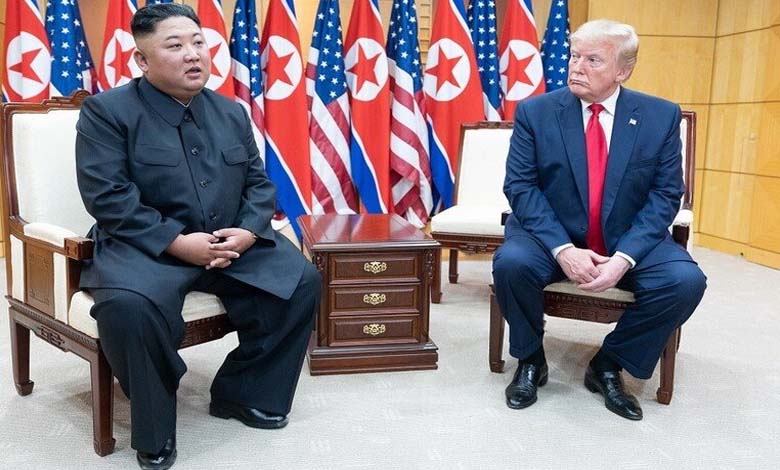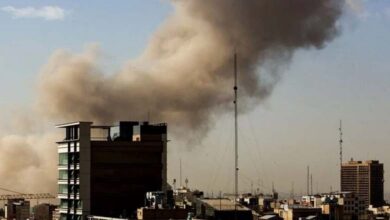Between Diplomacy and Defiance: Can Kim and Trump’s Smiles Dismantle a Nuclear Arsenal?

When politics is coated in smiles, it doesn’t necessarily signal a change in true intentions. North Korea exemplifies this in its dealings with Washington.
Despite talk of a “not bad” personal relationship between North Korean leader Kim Jong-un and former U.S. President Donald Trump, Pyongyang continues to reject any proposal to give up its nuclear program without concessions.
-
Missiles Smart Bombs and Stealth Drones… Kim Prepares for War with Cutting-Edge Weapons
-
Trump on Two Fronts: A Near Truce in Ukraine and Rapprochement with North Korea
This was reiterated by Kim Yo-jong, the North Korean leader’s sister and a senior official in the ruling Workers’ Party, who urged Washington in a statement to recognize her country as a nuclear state and adopt a new approach for resuming negotiations.
She stated that North Korea would only return to talks if the U.S. rewarded its partial nuclear concessions.
Kim Yo-jong emphasized that personal understandings, no matter how friendly, cannot serve as a foundation for actual nuclear disarmament, adding that North Korea’s capabilities have advanced since the Trump–Kim talks began in 2018.
-
Washington and Seoul Military Drills: Pyongyang Warns of War Triggered by a “Single Accidental Shot”
-
Will Trump Recognize North Korea as a “Nuclear Power”?
According to the American newspaper Politico, some analysts believe Trump could still engage North Korea to achieve a diplomatic breakthrough. Others argue that Pyongyang sees its nuclear arsenal as a vital bargaining chip and will only relinquish it in exchange for tangible incentives, including easing of sanctions and halting U.S.-South Korean military drills.
Trump recently boasted about his personal rapport with Kim and expressed hope for resuming nuclear diplomacy. However, their high-stakes diplomacy during Trump’s first term collapsed after he rejected Kim’s broad demands for sanctions relief in exchange for dismantling a single nuclear site — a step Washington saw as insufficient.
Since then, Kim has conducted weapons tests to modernize and expand the nuclear arsenal.
-
Peace or Confrontation… North Korea’s Missile Messages to America
-
The Koreas on the Brink: Kim Threatens to Push the Nuclear Button under This Condition
Personal ties don’t override political strategy
In a statement carried by state media, Kim Yo-jong acknowledged that the relationship between her brother and Trump “was not bad.” However, she warned that if these personal ties are meant to force disarmament, Pyongyang would see them as a mockery.
She stated that North Korea’s nuclear power had “sharply increased since the first round of Kim–Trump diplomacy,” and any attempt to strip the country of its weapons would be categorically rejected.
Kim added that unless the U.S. recognizes the changed reality and moves beyond past failures, any future U.S.-North Korea summit would remain merely a hopeful fantasy for Washington. She suggested it would be more practical to explore other communication channels.
-
North Korea Vanishes from the Internet for Hours… Outage Severs Its Last Digital Ties
-
Unidentified Ballistic Missile: North Korea Launches New Missile Toward the Sea of Japan
As a senior official in the ruling party, Kim Yo-jong is responsible for relations with the U.S. and South Korea. South Korean officials and analysts believe she is the second-most powerful figure in North Korea, after her brother.
She was reportedly responding to a comment from a U.S. official suggesting that Trump remained open to negotiations. This likely referred to a Yonhap News Agency report quoting an anonymous White House official saying Trump is “still open to working with leader Kim Jong-un to achieve complete denuclearization of North Korea.”
-
For the First Time North Korea Acknowledges Deployment of Troops in Russia
-
For the First Time… Russia Reveals the Role of North Korean Soldiers in the Ukraine War
What does North Korea want?
Nam Sung-wook, former head of South Korea’s Institute for National Security Strategy, told Politico that North Korea is signaling its lack of interest in denuclearization talks and expects the U.S. to define what benefits it is willing to offer.
Nam suggested Trump’s potential interest in winning a Nobel Peace Prize could drive him to engage with Kim and agree to phased disarmament steps in exchange for political rewards.
He believes Pyongyang will demand broad sanctions relief, a halt to U.S.-South Korea joint drills — which it sees as invasion rehearsals — and other economic incentives.
-
Trump on Two Fronts: A Near Truce in Ukraine and Rapprochement with North Korea
-
North Korean Leader Calls for Building a ‘Modern Army’ Ready for War
Future prospects
Kim Yeol-soo, a military affairs analyst in South Korea, said that U.S. and North Korean officials could meet if they can narrow differences over the conditions for resuming talks. However, Trump’s unpredictability makes it difficult to foresee what concessions the U.S. might offer.
Other experts note that Pyongyang, now increasingly engaged in military cooperation with Russia, does not currently see an urgent need to return to diplomacy with the U.S. or South Korea.
On Monday, Kim Yo-jong rejected the new South Korean administration’s overtures, saying its “blind faith” in the U.S. alliance and hostility toward Pyongyang made it no different from the previous conservative government.











